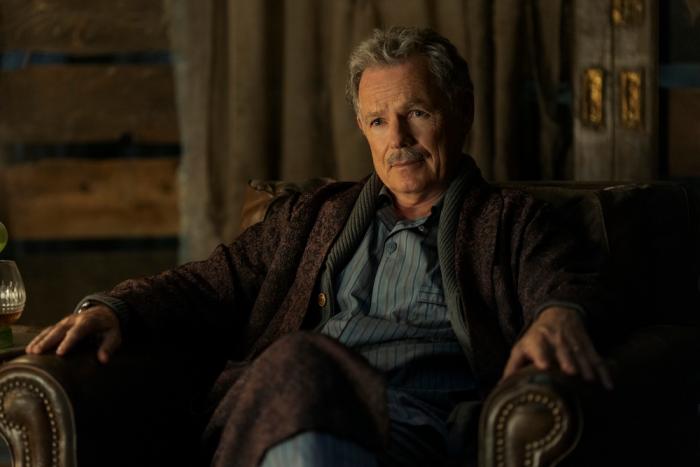

What Do 'Succession' And 'The Fall Of The House Of Usher' Really Have In Common?
By Tori Preston | TV | October 21, 2023 |
By Tori Preston | TV | October 21, 2023 |

Everywhere I looked last week, Succession was in the headlines … of articles talking about another show entirely. From GQ to Teen Vogue and even the Chicago Sun-Times, outlets couldn’t keep HBO’s recently wrapped drama out of their mouths when reviewing Mike Flanagan’s latest and last Netflix venture, The Fall Of The House Of Usher. In fact, “Succession meets Edgar Allan Poe” was used almost verbatim in headlines from Entertainment Weekly, TV Guide, and Mashable. It was so prevalent by the time I was settling in for my own binge that I half expected Brian Cox to show up dressed as a raven.
To be fair, the comparison is undeniable; both shows revolve around the death throes of a fictional modern American dynasty, a should-be-too-big-to-fail family business with a powerful patriarch at its head and numerous underwhelming offspring waiting in the wings. Each series also wears its real-world inspirations on its sleeves: Flanagan’s Usher is a vicious, gothic riff on the Sackler pharma family, and Jesse Armstrong’s Roy family is a thinly veiled sketch of the Murdochs. But that’s where the comparison ought to run out of steam, right? After all, how can the heightened giallo-adjacent horror of Usher have anything more in common with the grounded, methodical boardroom shake-ups of Succession?
Actually, I’d argue there’s an even bigger thread tying the two shows together, a foundational theme that each series tackles from opposing directions: Consequence. What does consequence look like for the super rich, the 1%, and is it even possible? Succession parades a series of personal disappointments as comeuppance and leaves it to the viewer to recognize that any hints of larger repercussions all seem to fall to the wayside. Take, for example, the Department of Justice investigation into Waystar’s handling of its sexual misconduct scandal. From the congressional hearing to the internal wrangling over a potential fall guy to the attempt to leverage the President into intervening, this moment seemed to be the largest existential threat to the company and thus to our characters. The scandal was simmering in the background from season one, came to a head late in season two, and continued into season three until it just… disappeared, literally between episodes, with an offhand mention of a settlement. Legal consequence, Succession seemed to say, isn’t a thing if you’ve got enough money and influence, and the show intentionally underplayed the resolution because it was beside the point. The investigation wasn’t about real consequences at all. It was merely a window into how the Roys would crack under pressure. And oh, how they cracked.
Succession, as the title suggests, was about the question of legacy. Which child would take the reins of Waystar after Logan? The answer was none of them, and it’s easy to think of the finale and imagine that, at least, was a form of consequence. Kendall, Shiv, and Roman lost, individually and as a group, and despite how we might empathize with them, their incompetence makes it hard to argue they deserved anything more. Rather, we should be thinking about how they deserved less! Kendall sorta killed a guy and covered it up, Shiv helped silence the victims of Waystar’s scandal, and Roman helped get a fascist into the White House (or near enough for recounts). Succession mines the cognitive dissonance of our investment in the characters, making us feel for their loss when in reality those kids still walked away with their freedom and fortunes intact. Other than some bruised egos, they’re fine — and that’s probably more than they deserve.
In contrast, The Fall Of The House Of Usher seems to be all about making its characters pay. Where Succession underlined the lack of real consequences by focusing on hurt feelings instead, Usher invests wholly in fantastically brutal punishments that are so patently fictional they read as wishful thinking — the exact sort of justice these people would never get outside of a story.
Of course, the key twist here is that the parade of deaths isn’t exactly a consequence either, or at least not to the targets. The Usher family is cursed to extinction thanks to the bargain Roderick and Madeline struck with Verna (or The Raven) on New Years Eve, 1980: All the money, power, and influence to fulfill their dreams, but only during Roderick’s lifetime — and at the expense of the continuation of the Usher bloodline. One other fun little tidbit of the deal? The Ushers would be legally untouchable — making explicit the lack of real-world consequences they face, which Succession only implied. Anyway, the deaths of Roderick’s children decades later are the consequence of their father’s choice, to sacrifice his legacy for his own fulfillment. However, the nature of those deaths was very much determined by the target. As Chris pointed out in his Usher rundown earlier this week, firstborn Frederick (the, ahem, “eldest boy”) won the most-deserved-death competition because of the severity of his own crimes — but that’s not really what set him apart. The difference is that Verna gave all of his siblings an opportunity for grace — to make their own deaths a little easier, precisely because they were less guilty. Or perhaps because they were only guilty of trying to impress their father. Tamerlane had time to call Bill and apologize. Prospero had time to call off the waterworks and spare his guests. Even Leo could have adopted a different cat, and Camille could have walked away from the lab and died at home, peacefully. None of them recognized the chances they were given, and all of them died in horrible, Poe-inspired ways, but only Frederick wasn’t given any chance at all. In fact, Verna actually interfered to ensure he died alone, in a pit and pendulum of his own making, because his crime was so extreme.
In Usher, money and power aren’t enough to divert the repercussions of the characters’ actions — but only because that money and power came from Verna’s immortal agent of justice in the first place. If you take her away, you’re left with a father who will throw any of his kids under the bus for the sake of his company, and who is willing to set them against one another in competition for his favor. A father not unlike Logan Roy, really. “Legacy” is a pretty lie to these self-made men, who hold their success more dearly than their own children. There is no passing of the torch because, deep down, they can’t respect the kids they’ve given everything to on a platter anyway, or maybe it’s simply because their empires were only ever designed for their own personal enjoyment. The very qualities that made Logan and Roderick such titans of industry — ruthlessness, selfishness, and grand vision — also made them terrible fathers, resulting in their broods of broken offspring. Perhaps that’s why the Roy siblings, and even the Usher kids (minus Frederick), were so sympathetic. Not because they were innocent, but because their flaws were unavoidable. If there is a tragedy in these shows, it’s that the kids never turn their backs on the family business or on their fathers. They stick around, hoping for a scrap of affection to validate them, not realizing that their complicity is a trap. Even when grace is offered to them, they can’t recognize it.
So, what are the consequences here? Nothing concrete — not the loss of power or influence, surely. Not legal repercussions, ever. Consequence is not felt by the fathers, who get exactly what they bargained for to their last breath. And it isn’t really felt by the children, except insofar as they are given the world while being denied only one thing — their father’s love — and thus being doomed to a comfortable, unsatisfying existence. No, when it comes to the lives of the 1%, the real consequences are felt by the rest of us, living in the world of bad drugs and media filth these titans have created and then left behind. Their legacy isn’t family, it’s the broken lives and literal bodies they leave in their wake. It’s the rubble of their houses falling down on the people below them.
← 'Loki' Season 2, Episode 3: Miss Minutes and Balder In '1893' | The Bad Bunny Hosted 'SNL' Featuring Pedro Pascal Is 60 Percent Spanish and Estupendo →
More Like This
Jordan Klepper Got A "Glimmer Of Hope" From A Trump Supporter
Leave Josh Peck Alone, Says Drake Bell in the Wake of 'Quiet on the Set' Revelations
The Problem with Peacock's 'Apples Never Fall' Is Its Infuriating Ending [Spoilers]
Jax Taylor and Brittany Cartwright on ‘The Valley’ Premiere: ‘The Drama Followed Us’
Yes There Are Other Shows But Come On Of Course We Watched 'Chicken Nugget' For Podjiba!

Jordan Klepper Got A "Glimmer Of Hope" From A Trump Supporter
Leave Josh Peck Alone, Says Drake Bell in the Wake of 'Quiet on the Set' Revelations
Sophie Turner Has ‘Reactivated’ Her Divorce From Joe Jonas
Is Aaron Taylor-Johnson The Next James Bond?
Sydney Sweeney Is All Business When It Comes to ‘Madame Web’: ‘That Film Was a Building Block’
Megan Fox Helpfully Lists All The Plastic Surgery She's Had
More Like This
Jordan Klepper Got A "Glimmer Of Hope" From A Trump Supporter
Leave Josh Peck Alone, Says Drake Bell in the Wake of 'Quiet on the Set' Revelations
The Problem with Peacock's 'Apples Never Fall' Is Its Infuriating Ending [Spoilers]
Jax Taylor and Brittany Cartwright on ‘The Valley’ Premiere: ‘The Drama Followed Us’
Yes There Are Other Shows But Come On Of Course We Watched 'Chicken Nugget' For Podjiba!
Reviews